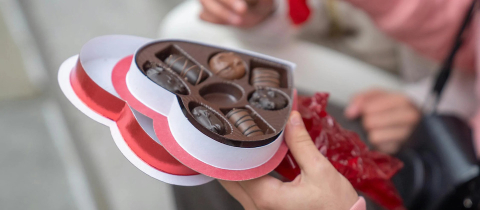The aphrodisiac story of chocolate is an ancient one, going back all the way to 1519 and the first visit of the Spanish explorer Hernando Cortes to Mexico. Cortes found much to his liking here, in particular the Aztec princess Dona Marina. Apparently the affection was returned because the princess introduced Cortes to a drink made from the pods of a tree which the Aztecs called "chocolatl," or "food of the gods." The concoction was also laced with dried chili peppers, and as Dona Marina said, would "stimulate amorous adventures."
Cortes must have been impressed by the effects because on his return to Spain he presented Emperor Charles V with a sample of cocoa, as we call the substance today. Within a few years, Europeans were indulging in chocolate and singing its praises. Everyone except nuns that is; they were forbidden to partake of chocolate's pleasures because of the potential consequences. But alas, chocolate does not have aphrodisiac properties! The myth can be ascribed to the presence of general stimulants in chocolate, such as caffeine, theobromine, and anandamide. Phenylethylamine (PEA), an amphetamine-like substance that has been alluringly labeled the "chemical of love," makes the best case for the love-chocolate connection since it has been shown that people in love may actually have higher levels of PEA in their brain, as surmised from the fact that their urine is richer in a metabolite of this compound. In other words, people thrashing around in the throes of love pee differently from others.
So all that chocolate being sold leading up to Valentine's Day is based on the following thought process:
Falling in love is associated with higher PEA levels. Chocolate contains PEA. Therefore chocolate can make us fall in love. Right?! Wrong.
Because blood levels of phenylethylamine do not rise after eating chocolate! In fact, it seems that most of this enchanting compound is metabolized during digestion. Furthermore, chocolate isn't even a very good source of PEA, sauerkraut on the other hand, is far better.
But that doesn't make for nearly as good a Valentine's Day story.







